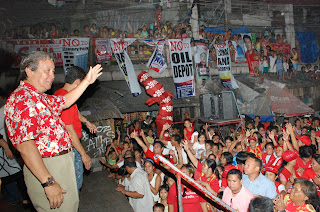BIG DEAL by Dan Mariano, Manila Times, March 1, 2010From the moment the issue was brought to the

magistrates’ attention, it was already clear how the Supreme Court would rule on whether or not government appointees should resign once they launch their candidacies.
It would have been entirely unfair if, say, a Cabinet member were allowed to hang on to his post—with all its attendant resources and perks—while simultaneously going on the proverbial stump.
For one thing, Lito Atienza told a group of newsmen the day he announced he was quitting his Cabinet post last December, “the official in question would not be able to carry out his duties properly.”
Thereafter, Atienza immersed himself in his campaign to regain the mayoralty of the Manila—against an increasingly unpopular incumbent whom many Manileños blame for the rapid deterioration of their beloved city.
Months before the Supreme Court ruled that appointive officials who are running for elective office in May were deemed resigned Atienza had already cleared his desk and said his farewells to his coworkers at the Department of Environment and Natural Resources (DENR).
For a gentleman of the old school like Lito Atienza who still abides by the oft-cited, but rarely observed, principle of delicadeza, “it was the decent thing to do.”
He added: “I have to be fair to the office I occupied. I was especially mindful not to use its considerable powers in order to boost my candidacy.”
Lito Atienza, of course, was not the only Cabinet member who did not need to be shown the door by a ruling from the high tribunal no less. Gilberto Teodoro left the Department of National Defense and Bayani Fernando the Metropolitan Manila Development Authority soon after they unveiled their respective bids for elective office.
Several other members of President Arroyo’s official family, however, chose to hang on as long as they could—despite their well-known plans to run for congressional seats. Whether or not their temporizing would affect their campaign is debatable.
In Atienza’s case, however, his early anticipation of the Supreme Court ban has proved to be a real boon. Quitting his Cabinet post last year allowed Atienza to move quickly in order to consolidate his forces and win fresh supporters.
Opinion polls in December showed Atienza lagging behind incumbent Mayor Alfredo Lim and even ex-police chief Avelino Razon. By February, however, surveys showed Atienza erecting a strong lead, causing his rivals to resort to all manner of gimmickry and strong-arm tactics.
Recently, for instance, the ex-DENR chief’s sportsman-son, Ali Atienza, denounced what he described as Lim’s roving band of “goons” who have been illegally tearing down campaign materials displayed in the private homes of Atienza supporters.
Displaying campaign materials within the confines of private residences is allowed by law, but the goons the younger Atienza referred to were reported to have harassed several homeowners in the districts of Tondo and Quiapo—with total impunity.
Complaints to city police were reportedly met with blank stares from the officers—which indicates either their ignorance of Republic Act No. 9006, otherwise known as the “Fair Election Practices Act,” or their partisanship for Lim, himself a former cop.
Ali Atienza, who is the campaign manager of his father’s Buhayin ang Maynila ticket, assured the harassment victims that volunteer human rights lawyers were preparing appropriate charges against the “goons” who were seen using vehicles with government license plates.
Widespread disenchantment with the incumbent city administration has caused the ranks of Atienza’s camp to swell beyond his loyal following of longtime Liberal Party comrades and ward leaders in all of Manila’s six districts.
For instance, organizers of a fundraising dinner last February 19 at Century Park Hotel restaurant had reserved 100 tables. But the gathering soon developed into a standing-room only affair—causing one observer to describe it as a “howling success.”
The dinner was attended by leaders of street-vendor groups and associations of small and medium-sized enterprises as well as representatives of Big Business. From all walks of life they came for Atienza.
The campaign donations raised that evening, Buhayin ang Maynila officials said, were duly documented for the purposes of the Bureau of Internal Revenue.
 The actual donations and pledges were a big boost to Atienza’s war chest, said one coalition insider. The campaign donors’ enthusiasm was fueled by the come-backing mayor’s presentation of his platform, including a plan to revitalize the Baywalk project, which Lim had ordered dismantled in 2007.
The actual donations and pledges were a big boost to Atienza’s war chest, said one coalition insider. The campaign donors’ enthusiasm was fueled by the come-backing mayor’s presentation of his platform, including a plan to revitalize the Baywalk project, which Lim had ordered dismantled in 2007.
Atienza also gave a general overview of his plans for the controversial oil depot in Pandacan, which he had ordered shut down while he was still mayor—an order that was quickly reversed by Lim as soon as he took office three years ago.
Atienza pointed out that the 36-hectare depot in the middle of a heavily populated district—far from being a gold mine for the city as Lim claims—contributes just P200 million in fees and taxes to the city’s coffers.
He reminded his audience that a similar depot had once stood in what is now the Rockwell complex in Makati.
“Rockwell is far smaller in size than the area now occupied by the oil depot in Pandacan,” Atienza said. “But it now generates far more funds in terms of tax collections—not to mention investments, businesses and jobs—for the City of Makati.”
He explained; “The Pandacan depot, if properly developed, would become our version, not just of Makati’s Rockwell, but also of Quezon City’s Eastwood in Libis.”
As a licensed architect, Atienza knows of what he speaks—and his audience at the Century Park fundraiser was aware of his reputation and record as an urban planner.
One enthusiastic contributor was overheard saying: “With this plan, investors will finally return to Manila.”
Across the Pasig River from the depot is a former industrial estate, which has gone to seed. Once the site of busy factories and thriving businesses, Atienza said, the so-called NDC compound could be revived to suit the requirements of domestic and foreign investors.
Lito Atienza said, City Hall should not merely be a collector of rent and taxes, which Lim fears would be lost if the oil depot is closed down.

The city government, Atienza stressed, needs to have a vision for business growth, a master planfor generating businesses and, consequently, employment—and from there the resources to upgrade civil works and other infrastructure.
Above all, City Hall needs to have tried and tested leadership for urban renewal, said Atienza whose various projects from 1998 to 2007 south of the Pasig led to the gentrification of Ermita, particularly the Remedios Circle. Yet, this effort too was reversed by the Lim administration.
If the eager support Atienza got at the February 19 fundraiser were any gauge, he has apparently succeeded in getting Manileños eagerly anticipating his return to City Hall. Their excitement was palpable, to say the least.



